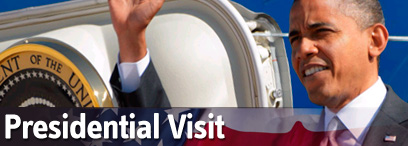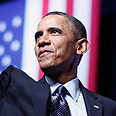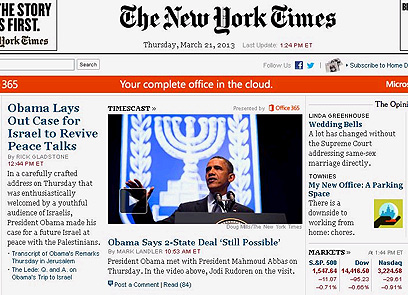

American news outlets crowned United States President Barack Obama's speech in Jerusalem Thursday as a "great speech," comparing it to his milestone "Cairo speech" at the beginning of his first term.
But the question remains, journalists and commentators said, whether Obama can follow through after raising expectations for the Middle East peace process.
Related stories:
- Obama begins final day in Israel
- President Peres bestows Medal of Distinction on Obama
- Student who heckled Obama: 'Provocative speech'
Washington Post commentator Max Fisher wrote that both the Cairo and the Jerusalem speeches deviated from traditional rhetoric and directly addressed the people, not their leaders.

Fisher pointed out that Obama stressed the connection between the Jews and the land of Israel, a point he previously neglected. He also noted Obama's statement that calls for Israel's annihilation are empty, since Israel "isn't going anywhere."
"Obama here is moving away from the traditional dynamic in Israel of peace-versus-security," Fisher wrote.
"Obama led up to this line with several paragraphs on America’s support for Israel and their two countries’ combined ability to defend against the very real threats in the region, helping him to frame the security of
Israel’s existence as a given. "

Fisher wrote that the more the US can guarantee Israel's security, the more leeway it gives Israel to ignore the question of "Can we survive?" in favor of "Now that we know we have a future, what do we want
that future to look like?" which is possibly the reason why Obama insisted on addressing young Israelis, who are less likely to remember the wars of 1967 and 1973.
According to the Fisher, Obama wanted to shift away from the old discussion about what Israel has to do to keep its state, to the question of what sort of state is to be desired.

By this question, Fisher explained, Obama is referring to the danger of defining Israel as a Jewish and democratic state in light of the growing Palestinian population in the West Bank and continued occupation.
"The lingering question," Fisher asks, "as after Obama’s 2009 speech in Cairo, is whether those new ideas will be followed by new actions."
On CNN analyst David Rothkopf wrote under the headline "Obama goes over Netanyahu's head to the Israeli people," that the speech was a great one: "Boldly, pointedly and deftly, he provided a virtuoso display of political leadership and international statesmanship."
"It stands as a companion piece to his great speech in Egypt early in his first term about America and the Arab world. And his great speech in the Czech Republic about nuclear disarmament. And his great Nobel Prize acceptance speech. And his many other great addresses."
Speachmaker or Peacemaker?
Nevertheless, the measure of these great speeches, wrote Rothkopf, will be in their outcomes.
"It is, after all, easier to be a speechmaker than a peacemaker," Rothkoph warned.
"And in the wake of Obama's energizing address, he must now face greatly raised hopes that he will follow up on his words more successfully than he has the Cairo or Prague remarks."
A great speech, Rothkopf wrote, is one that makes its listeners uncomfortable, and lists Prime Minister Benjamin Netanyahu as the first person among those, despite Obama's declaration of the US commitment to Israel's security.
"Obama sent a message to Netanyahu that if need be he would go over his head to the Israeli people," Rothkopf remarked, saying this was the reason Obama gathered a young crowd which cheered him on, even when he criticized settlement construction and the need for a Palestinian state.
Nevertheless, Palestinian President Mahmoud Abbas probably was not sitting too comfortably in his own seat in light of Obama's reiteration of Israel's definition as a Jewish state – a definition even moderate Palestinians object to.
"In the end, it was the most potent speech an American president has ever given in Israel about the peace process, the most personal statement of commitment to it," Rothkopf wrote.
"And therefore it must have made very uncomfortable the small group of American diplomats and national security specialists who are going to have to follow through and try to live up to its promise with their actions.
"Obama must make himself central to this process, actively and continuously, or the hopes it has raised will once again be cruelly deflated."
Jonathan Marcus, the BBC's diplomatic correspondent, wrote: "President Barack Obama did not bring a new peace plan or initiative to Jerusalem but his speech, to a mainly young audience, was about as strong a message he could give that the status quo is intolerable and that peace has to be given a renewed chance."
Marcus discussed Obama's Middle East diplomatic failures on his first term – some caused by insistence on settlement construction freeze – and many Israelis distrust of him and their sense that Obama does not understand their predicament.
Marcus also stressed speech's deviation from accepted rhetoric and Obama's focus on the impossibility of Israel continued existence as a Jewish and Democratic state without a Palestinian state by its side.
"Now," he wrote, "all eyes will be on Mr Obama's new Secretary of State John Kerry to see what practical
life can be breathed into the president's words of hope."
- Receive Ynetnews updates
directly to your desktop















